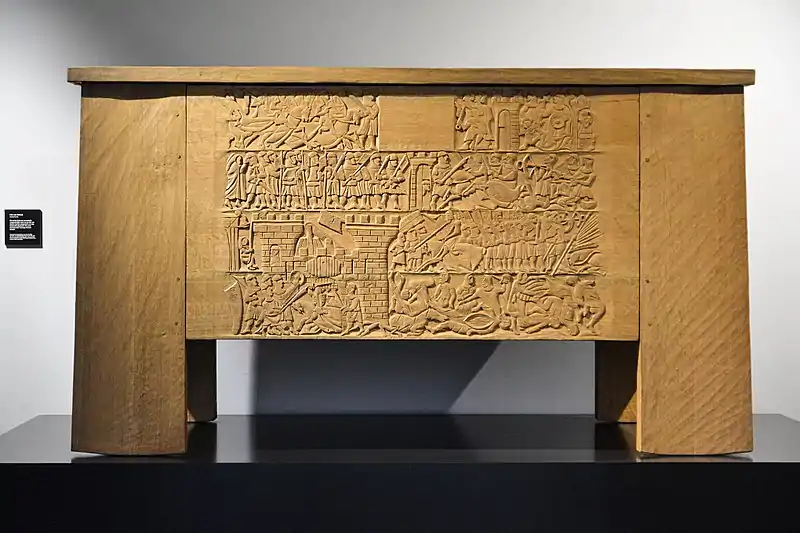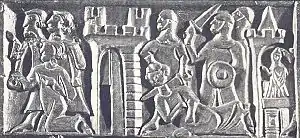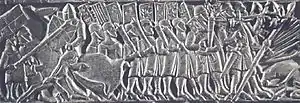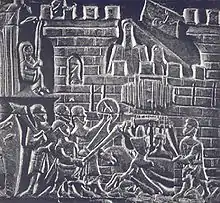Courtrai Chest
The Chest of Courtrai (Flemish; Kortrijk) is a medieval oak chest that bears a carving depicting scenes from the Franco-Flemish War, including the 1302 Battle of the Golden Spurs at Kortrijk, Flanders, between Flemish citizen foot-soldiers and French Knights. The chest is among the few surviving contemporaneous depictions of those historically significant events.
History
The Chest was discovered around 1905 in the village of Stanton St John, a village largely owned by New College, Oxford. Found by Warden of the College William Archibald Spooner (of Spoonerism fame) on a 'Warden’s Progress', it was in a barn of a College tenant where it was used as a feed bin! [1][2] Nothing is apparently known of the Chest's 600-year journey from Flanders to Oxford.[3]
Description
The Chest surround is a 17th-century construction, but the carved front-face is the Flemish original, measuring 102 cm by 71 cm, dating from the 14th century.[4] The carving illustrates scenes (below) from the Bruges Matins and the Battle of the Golden Spurs. Fought in Kortrijk (Fr. Courtrai), Flanders, on 11 July 1302, the battle was a citizens’ uprising against the French, King Philip IV of France having annexed Flanders some years before. The battle secured an unexpected victory for the Flemish artisan footmen against the army of French knights.
An image of the Courtrai Chest at New College, Oxford, can be found on their website.[1] The image below shows the full-sized reconstruction of the original chest, on display at the 'Kortrijk 1302' museum in Belgium, where it is known as 'De Kist van Oxford':

Significance
The victory (and thus the Chest) marks an important historical and cultural reference point for the people of Flanders and is commemorated as an official holiday, 'Feestdag van Vlaanderen', by the Flemish Community in Belgium. The battle demonstrated, possibly for the first time, the ability of foot-soldiers to defeat armed mounted knights; a fact that changed the composition, tactics and cost of European armed forces over the following century.[5] The Chest is consequently of significant interest to military historians.
Location
The Chest is on deposit at the Ashmolean Museum, Oxford, where it can be seen in the Medieval gallery.
A fine reproduction of the Chest's carving is kept on display at the Kortrijk1302 museum, where it is known as the 'Chest of Oxford', as part of an extensive exhibition of artefacts concerning the 1302 battle.[6] This reproduction comprises a reconstruction of the whole chest (shown above), including the stiles or legs supporting it, as would have been present in its original form, but are missing from the remains of the original, found in Oxford.[2]
Scenes

The Bruges Matins 
Arrival of Guy of Namur and William of Jülich at Bruges 
Siege of Wijnendale Castle 
Line-up of the town militias on the battlefield 
The Flemish line of battle during the Battle of the Golden Spurs 
The attack of a French garrison at Courtrai 
Collection of the booty: the Golden Spurs
See also
Bibliography
| Wikimedia Commons has media related to Chest of Courtrai. |
Ffoulkes, Charles (July 1912). "Carved Chest at New College, Oxford". The Burlington Magazine for Connoisseurs. 21 (112): 240–1. JSTOR 859053.
References
- New College, University of Oxford, Treasures and Chattels: http://www.new.ox.ac.uk/courtrai-chest
- Early Furniture-I. Coffers by Aymer Vallance, The Burlington Magazine for Connoisseurs, June 1912, volume 21, issue 111, pages 153–161.
- Flanders became the major European centre of flax production and the linen industry in the Middle Ages. English linen merchants were regular visitors and occasional residents there, so one of them is possibly the route by which the Chest was obtained and taken to England.
- Carved Chest at New College, Oxford by Charles Ffoulkes, The Burlington Magazine for Connoisseurs, July 1912, volume 21, issue 112, pages 240–1
- Rogers, Clifford J. (1999). The Age of the Hundred Years War. In Keen, Maurice. Medieval Warfare: A History (Reprint ed.). Oxford: Oxford University Press. ISBN 0-19-820639-9.
- Kortrijk 1302 Museum http://www.kortrijk1302.be/, Kortrijk 1302, Begijnhofpark z/n, 8500 Kortrijk. Kortrijk1302@kortrijk.be